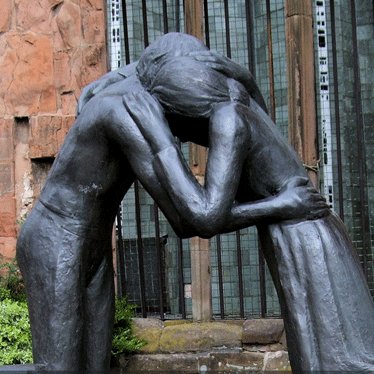 Jesus said to his disciples ‘If your brother does something wrong, go and have it out with him alone, between your two selves. If he listens to you, you have won back your brother. If he does not listen, take one or two others along with you: whatever the misdemeanour, the evidence of two or three witnesses is required to sustain the charge. But if he refuses to listen to these, report it to the community; and if he refuses to listen to the community, treat him like a gentile or a tax collector.
Jesus said to his disciples ‘If your brother does something wrong, go and have it out with him alone, between your two selves. If he listens to you, you have won back your brother. If he does not listen, take one or two others along with you: whatever the misdemeanour, the evidence of two or three witnesses is required to sustain the charge. But if he refuses to listen to these, report it to the community; and if he refuses to listen to the community, treat him like a gentile or a tax collector.
‘In truth I tell you, whatever you bind on earth will be bound in heaven; whatever you loose on earth will be loosed in heaven.
‘In truth I tell you once again, if two of you on earth agree to ask anything at all, it will be granted to you by my Father in heaven. For where two or three meet in my name, I am there among them.’ (Matthew 18:15-20)
Chapter 18 of St Matthew’s Gospel is often referred to as the Sermon on the Church. It contains the teaching of Jesus about the life of the Christian community.
Today’s reading details a procedure for dealing with differences and disputes. It follows the Parable of the Lost Sheep which is concerned with seeking out and bringing back the one who gets lost.
In the same way, resolving disputes is not about being right or punishing an offender, but about conversion and reconciliation.
The three-stage process moves from individual dialogue to a small group trying to sort things out, to the whole community being involved in discernment and decision.
Traditionally, we have understood the words, ‘if he refuses to listen to the community, treat him like a gentile or a tax collector’, to mean that the person should be expelled or excommunicated from the community.
However, Jesus was notorious for sharing meals with tax collectors and sinners and he called one of them, Matthew, into his inner circle of disciples. At the end of the Gospel, Jesus instructs the disciples not to reject the pagans but to invite them to become children of God. Excommunication doesn’t seem to fit either with the sentiments in the Lord’s Prayer about forgiveness.
The parable of the Lost Sheep, immediately before this passage, seems to indicate that the church, following Jesus’ example, should never give up on any of the sheep, especially the lost ones. It has a responsibility to try to win them back.
The next verse about ‘binding and loosing’ extends to the community the power of authoritative decision-making given to Peter and the disciple-leaders in the Gospel of two Sundays ago. This decision-making follows community discussion and discernment about what is to be done.
If members of the community pray and discern together about how to win back the lost one, their prayer will be heard, even if only two pray. Jesus reminds them that whenever members of the community gather in his name he is present with them.
We share a common responsibility for the lives and faith of one another and for our community as a whole. Our presence, example and prayer encourage and confirm the faith and life of Jesus among us. May we be generous to one another.
Join us in celebrating at home this Sunday using the links below.
Celebrating At Home for 23rd Sunday in Ordinary Time PDF
Celebrating At Home for 23rd Sunday in Ordinary Time EPUB














